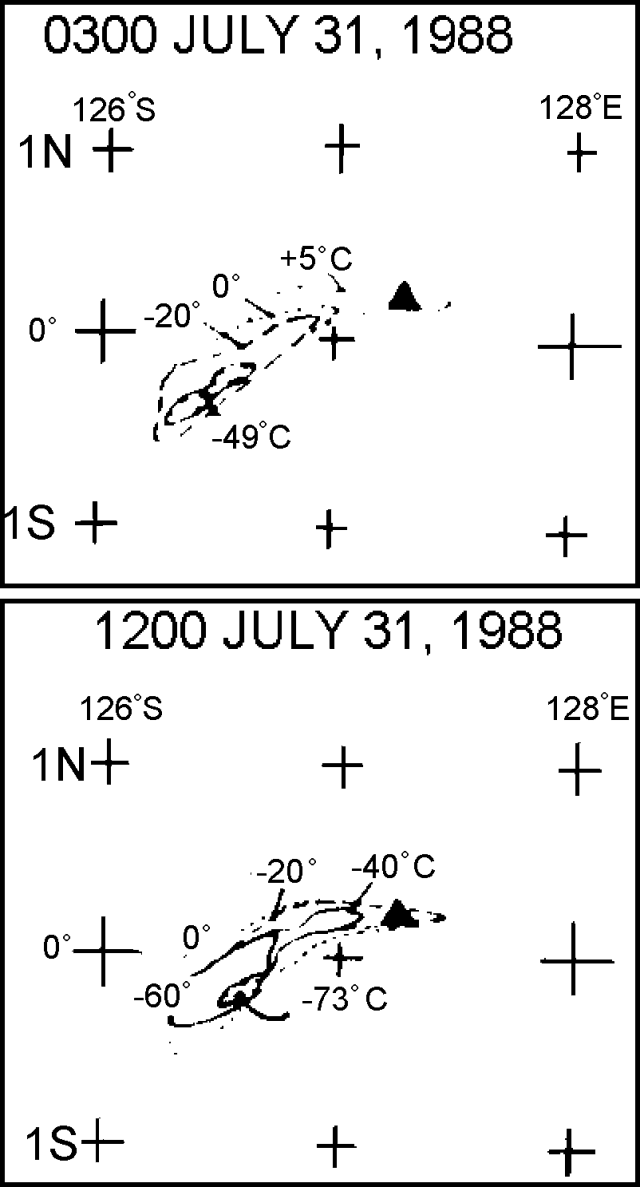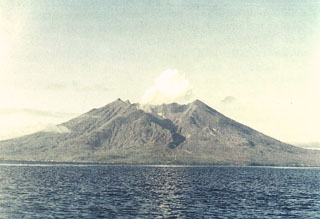Report on Kie Besi (Indonesia) — October 1988
Scientific Event Alert Network Bulletin, vol. 13, no. 10 (October 1988)
Managing Editor: Lindsay McClelland.
Kie Besi (Indonesia) Satellite data on July plumes
Please cite this report as:
Global Volcanism Program, 1988. Report on Kie Besi (Indonesia) (McClelland, L., ed.). Scientific Event Alert Network Bulletin, 13:10. Smithsonian Institution. https://doi.org/10.5479/si.GVP.SEAN198810-268070
Kie Besi
Indonesia
0.32°N, 127.4°E; summit elev. 1357 m
All times are local (unless otherwise noted)
New data from Japan's GMS satellite.... An image at 1200 on 29 July (figure 1) shows a dense plume with a surface temperature of -70°C (figure 2), suggesting an altitude of 15.2 km (table 1).
Table 1. Analysis of GMS satellite data by Yosihiro Sawada, with parameters of the 29 July Makian plume and possible eruption clouds on 31 July 1988.
| Date | Local time | Attached to volcano? | Width (km) | Length (km) | Direction | Surface Temp. | Height (km) |
| 29 Jul 1988 | 1200 | yes | 60 | 110 | SW | -70°C | 15.2 |
| 29 Jul 1988 | 1500 | no | 90 | 310 | SW-W | -61°C | 13.5 |
| 29 Jul 1988 | 1800 | no | 80 | 430 | SW-W | -50°C | 12.1 |
| 29 Jul 1988 | 2100 | no | 90 | 450 | SW-W | -- | -- |
| 31 Jul 1988 | 0300 | no | 30 | 130 | SW-W | -49°C | 11.9 |
| 31 Jul 1988 | 0600 | no | 20 | 60 | SW | -20°C | 7.6 |
| 31 Jul 1988 | 0900 | yes | 50 | 210 | SW | -14°C | 6.8 |
| 31 Jul 1988 | 1200 | yes | 40 | 130 | W-SW | -73°C | 15.6 |
By the time of the next image, three hours later, the plume was detached from the volcano and was noticeably more diffuse. Possible volcanic plumes were also detected on GMS imagery returned 31 July (figures 1 and 3), but no ground reports of large eruption clouds are known at those times.
 |
Figure 3. Temperature gradients in the clouds shown in figure 1. Makian is marked by a solid triangle. Courtesy of Y. Sawada. |
Geological Summary. Kie Besi volcano, forming the 10-km-wide Makian island off the west coast of Halmahera, has been the source of infrequent, but strong eruptions that have devastated villages on the island. The large 1.5-km-wide summit crater, containing a small lake on the NE side, gives the peak a flat-topped profile. Two prominent valleys extend to the coast from the summit crater on the north and east sides. Four cones are found on the western flanks. Eruption have been recorded since about 1550; major eruptions in 1646, 1760-61, 1861-62, 1890, and 1988 caused extensive damage and many fatalities.
Information Contacts: Y. Sawada, JMA.

